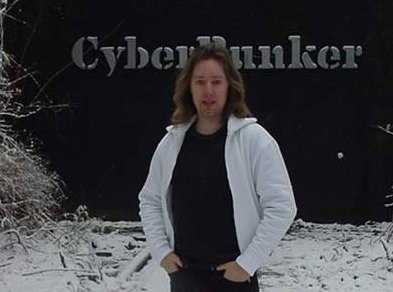With its next documentary, “Cyberbunker: The Criminal Underworld,” which is scheduled for premiere on November 8, 2023, Netflix is sure to attract audiences. This gripping and captivating documentary explores a network of dark online activity while going deep within a picture-perfect German town. This documentary centers on an underground bunker from the Cold War era that has been turned into a refuge for mysterious and infamous cybercrime. This underground realm revolves around a gang of Dutch people under the mysterious leadership of Herman Xennt. Their bold scheme centers on seizing an enormous NATO bunker buried beneath the charming village of Traben-Trarbach. And who is this man, Xennt, running its affairs? tvacute will delve into the details of Xennt’s life, his part in the CyberBunker story, and the fascinating aspects that surround him in this investigation.
Who is the founder of Cyberbunker? Where is he now?
Who is ‘Herman Xennt’?
The mysterious individual at the center of “Cyberbunker: The Criminal Underworld,” Herman Xennt, is a man of mystery. Even though he is portrayed in the video as a “darknet Guru,” it is important to learn more about him. People are incredibly curious and intrigued by Xennt’s true identity, background, and goals.
Founder of the Cyberbunker: ‘Herman Xennt’
Based on the evidence at hand, Herman Xennt is the head of a Dutch gang that wants to take over a large NATO bunker under the German town of Traben-Trarbach. According to Sven Olaf Kamphuis’s Crunchbase page, he was the spokesperson and founder of CyberBunker in 1998.
A major topic of the documentary is his attempts to convince the people of the town to accept him and his gang by promising them a happy future. But these assurances soon raise questions about his genuine motivations.
Xennt and his group initially try to gain the confidence of the town’s citizens by promising them a wealthy future. But as the tale develops, locals start to have their concerns, raising questions about the group’s genuine motivations. The town’s peaceful exterior is giving way to a sinister underground, forcing law enforcement to react forcefully to neutralize the threat. The teaser for “Cyberbunker: The Criminal Underworld” suggests that 650 police officers—including members of specialized tactical units—are involved in the fight against cybercrime.
According to this documentary, Herman Xennt is a “darknet Guru” who can seemingly run large-scale international criminal operations right beneath the noses of entire towns. There are intriguing and suspenseful concerns concerning the depths of the cyber underworld raised by this compelling story. Directed by Kilian Lieb and Max Rainer, “Cyberbunker: The Criminal Underworld” looks to be an engrossing examination of this intriguing tale.
‘Herman Xennt”s Early life
Xennt’s early life sheds light on his hobbies and the development of his distinct personality. Born in 1959 under the name Herman-Johan Verwoert-Derksen, he grew up in the eastern Dutch city of Arnhem. Xennt’s passion for historical architecture was perhaps influenced by the severe combat that took place in Arnhem during World War II, which gave the city historical value.
When Xennt was a teenager, he became fascinated with old buildings and visited an abandoned Nazi bunker outside Arnhem on multiple occasions. He was deeply engrossed with science fiction in addition to history. He chose to go by “Xennt,” which is pronounced as “Zent,” during this period of life. This moniker would later play a major role in his identity.
The 1977 release of “Star Wars” had a significant effect on him. His mind was captivated by the grand space opera, to the point where he converted his bedroom into a spaceship. The chamber had a science fiction feel to it with its blacked-out windows, homemade electronic doors, and dark synthesizer music coming from the speakers. His spaceship-themed room included an Apple II personal computer tucked away in one corner. His subsequent pursuits in the technology and computer industry were probably influenced by this early exposure to personal computers.
Xennt’s Professional Life
Xennt’s career was a complex web of inconsistencies. He was involved in the realm of covert hosting services that catered to illicit activity, but he also believed in the idea of an open, unrestricted internet. His beliefs in “free speech” and a “free Internet” appeared to be at odds with the illicit activity that CyberBunker enabled. He is Calibour GmbH’s managing director
Xennt broadened his pursuits by undertaking the encrypted-phone industry, creating programs such as “Underground” and “Exclu.” Third parties sold these apps all over the world under different brands, thus his phone company was more profitable than his hosting business.
Notably, Xennt’s encrypted phone network attracted the attention of investors like as Danny Manupassa and George Mitchell. Manupassa allegedly thought about investing a million euros, although it’s unclear if the money actually came in.
He was involved in many aspects of CyberBunker, from technological infrastructure to decision-making. Although he stated he was unaware of the content hosted on the servers, there is disagreement over how much of the content he actually knew. Xennt walked a tightrope between the legal and illegal, a rare combination of ambition and idealism that finally resulted in his detention and legal troubles.

On the other hand, an MDMA laboratory was discovered during a fire in a Dutch bunker in 2002, which prompted legal measures and some people’s convictions. After the incident, the corporation relocated its servers to sites above ground, including Amsterdam, although CyberBunker persisted in claiming to be associated with the bunker.
In 2009, The Pirate Bay, a well-known BitTorrent tracker with legal problems, shifted its operations to CyberBunker, which led to fines and legal action in Germany. Additionally, CyberBunker gained notoriety for a disagreement with Spamhaus that resulted in a significant denial-of-service attack against Spamhaus in 2013. CyberBunker was purportedly working with criminal organizations in this dispute. Sven Olaf Kamphuis, the company’s spokesperson, was arrested in 2013 but was given a suspended sentence.
A second bunker near Traben-Trarbach, Germany, which CyberBunker purchased in 2013 was the subject of a German cybercrime investigation and a massive raid in September 2019 that resulted in multiple arrests. Additionally, a massive denial-of-service attack against Deutsche Telekom in late 2016 was connected to this bunker. These occasions offer an insight into the contentious and frequently unlawful actions connected to CyberBunker and its principal figures.
Herman Xennt’s Personal Life: Relationship and Kids
Xennt’s connection with Angelique resulted in the birth of his two older boys, Xyonn and Yennoah. Their unusual names, Xyonn and Yennoah, are a reflection of their father’s taste for unusual and unusual choices. But after their split, Angelique took primary custody of the boys from Xennt.
When his sons grew into young adults, Xennt invited them to come and visit CyberBunker at the Traben-Trarbach property. The family did get to spend time together again, although it should be noted that their reunion was incomplete because Angelique and her sons continued to live in the complex’s above-ground barracks with other employees. Xennt also has another son who was born in 2019, yet the details he provides don’t reveal who the child’s mother is.
Who is Herman Xennt’s Sister? Where is she now?
Anna Van Wolferen is Xennt’s sister. In the essay, she and her spouse René Van Wolferen were discussed in relation to Xennt’s life. René Van Wolferen’s dual employment as an auxiliary fireman and pharmaceutical company employee demonstrates his strong ties to the community. Living in a village close to Arnhem, they exchanged information about Xennt’s character, passions, and pursuits, especially his affiliation with philanthropic organizations and the police visits to their residence concerning Xennt’s enterprises.
Where is Founder of Cyberbunker Herman Xennt Now?
The defense team in the cyber bunker trial is pushing for the main defendant, 62-year-old Dutchman Herman Johan Xennt, to be found not guilty in 2021. The trial involves a data center that is purportedly used for illegal purposes. Uwe Hegner, Xennt’s attorney, contended that Xennt lacked both the authority and the responsibility to decide what was housed on the servers in his data center. Michael Eichin, another attorney, underlined that running a data center is not illegal in and of itself. He said that Xennt shouldn’t be found guilty based on the “bulletproof” advertising promises made about the services provided by the data center, implying that the prosecution may be trying to create an example rather than find the correct person.
Xennt is awaiting trial, but because of COVID-19-related delays, the court case might not start until the fall. The scope of the illicit actions connected to CyberBunker is still being pieced together by prosecutors. On December 14, 2021, Xennt was given a five-year and nine-month prison sentence after a trial that lasted more than a year. The penalties imposed on seven additional defendants ranged from one year suspended to four years and three months in prison.
The other accused, who included Xennt’s own children, were arrested and given penalties ranging from four years to suspended sentences. Despite serving two months in jail, Kamphuis appears to have escaped punishment regardless of whether he was engaged with the German CyberBunker version or not. He had contributed significantly to the infrastructure of the bunker and the encrypted phone business. A 62-year-old man filed an appeal, but a higher court upheld his conviction in 2023, so he’ll be in jail until his sentence is up; records show that he’s currently serving time in a prison in Trier, Germany.
Nevertheless, we should emphasize that Xennt maintains his innocence to this day: “My trial was not fair, and so neither was the judgment,” “Nothing I could have said would have mattered. I was already convicted before I was arrested.” Xennt defends that he “[didn’t] even notice” customers were using his servers for criminal purposes. He also reiterated his belief that “privacy is a fundamental right,” warning that “the more communication evolves, the easier it becomes for third parties to eavesdrop and spy on” citizens.
Xennt, who became 64 years old in 2023, also cryptically indicated he has “many plans for the future,” following his prison release.
“I know that there is no one else who wants to or can do what I want to do,” he concluded. “You cannot stop me. I will still achieve my goals. Everything is ready. I just have to go home. I want to, and I will eventually be able to realize my vision for a better world. No one can stop me.”
CyberBunker was founded by Herman Xennt. The Dutch military de-assessed the bunker where Xennt founded the company in 1994. In the 1990s, the company catered mostly to pornographic websites with its “bulletproof hosting” service. Xennt’s development from a young man fascinated by science fiction and history to a leading person in the field of bulletproof hosting is evidence of the intricacy and enigma that characterize his existence.
Stories like Xennt’s serve as a reminder of the ongoing struggle between law enforcement and those who prefer to operate in the shadows in the ever-changing world of the internet. It’s a story that poses significant queries on the nature of accountability, freedom, and the thin line separating idealism and criminality in the digital era.
Even though it’s clear Xennt is in Trier, Germany right now, his legacy goes on as a representation of the mysterious characters that traverse the murky waterways of the internet, leaving us to wonder about the intricacies of their personal histories and the effects of their decisions on the virtual world.







